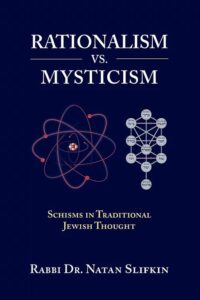REVIEW: Rationalism vs. Mysticism

 Through a close reading of Natan Slifkin’s new Rationalism vs. Mysticism: Schisms in Jewish Thought (Torah and Nature Foundation) Alex Ozar aims to get to the bottom of what it means to identify as a “rationalist,” what it means to divide the Jewish intellectual world into rationalist and mystical camps, and what’s at stake in asserting a “schism” in Jewish thought.
Through a close reading of Natan Slifkin’s new Rationalism vs. Mysticism: Schisms in Jewish Thought (Torah and Nature Foundation) Alex Ozar aims to get to the bottom of what it means to identify as a “rationalist,” what it means to divide the Jewish intellectual world into rationalist and mystical camps, and what’s at stake in asserting a “schism” in Jewish thought.
Writing in TRADITION’s recent Summer issue, Ozar appreciates Slifkin’s impressive efforts to make space for rationalism within traditionalist circles, yet worries that Slifkin’s ultimately defensive approach falls short of its full potential. What if, Ozar wonders, rather than merely saying that rationalism is just as legitimate as mysticism, we put forward the claim that rationalism is right? The result, he argues, is that “we would have a genuine disagreement within a community, rather than a difference of communities. This would entail the possibility of each vanquishing the other. But it would also entail the possibility of – and imperative toward – genuine, and perhaps generative, conversation across difference.”
We may take Slifkin’s work as a call to be better rationalists ourselves – if our reaction to the book is self-congratulation, we have missed a vital opportunity. Slifkin’s essential message is that we can and ought to be humane, rational, good, thoughtful, reflective, and critical—in and through our faithfulness to Jewish tradition. However well we do in that regard, we can always do better.
